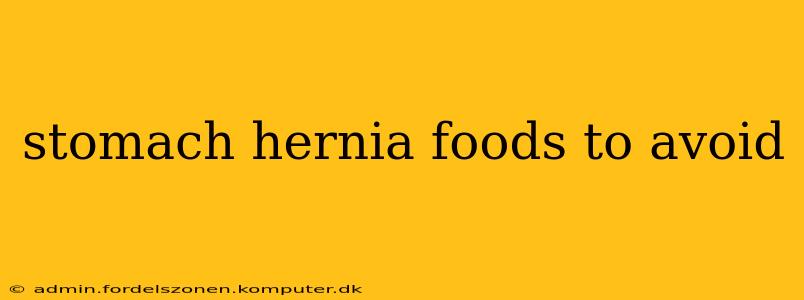A stomach hernia, or hiatal hernia, occurs when a portion of your stomach pushes up through the diaphragm, the muscle separating your abdomen and chest. While not always symptomatic, a hiatal hernia can cause discomfort, heartburn, and acid reflux. Managing these symptoms often involves dietary changes. This guide details foods to avoid if you have a stomach hernia, helping you navigate dietary choices for better gut health.
What Foods Should I Avoid with a Hiatal Hernia?
The foods you should avoid with a hiatal hernia largely depend on how your body reacts to them. However, certain food groups are more likely to trigger symptoms due to their acidity, fat content, or ability to relax the lower esophageal sphincter (LES), the muscle that prevents stomach acid from flowing back up into the esophagus.
High-Acid Foods: These are major culprits in triggering heartburn and acid reflux.
- Citrus Fruits and Juices: Oranges, grapefruits, lemons, and limes, along with their juices, are high in citric acid.
- Tomatoes and Tomato Products: Ketchup, tomato sauce, and even tomato-based soups can irritate the esophagus.
- Spicy Foods: Chili peppers and other spicy ingredients can increase stomach acid production and worsen symptoms.
- Coffee and Tea: Caffeine in these beverages can relax the LES, allowing stomach acid to reflux. Even decaffeinated versions can sometimes cause issues.
- Alcohol: Alcohol relaxes the LES and can irritate the esophageal lining, exacerbating symptoms.
Fatty Foods: These slow down digestion and increase pressure within the abdomen.
- Fried Foods: French fries, fried chicken, and other deep-fried items are high in fat and difficult to digest.
- Processed Meats: Bacon, sausage, and other processed meats often contain high levels of fat and preservatives.
- High-Fat Dairy: Full-fat cheeses, cream, and whole milk can contribute to digestive discomfort.
- Greasy Foods: Foods rich in saturated and unsaturated fats can trigger reflux.
Foods That Relax the Lower Esophageal Sphincter (LES): These allow stomach acid to easily reflux into the esophagus.
- Chocolate: The high fat and caffeine content in chocolate can weaken the LES.
- Mint: Peppermint and spearmint can relax the LES. Avoid peppermint tea, candies, and chewing gum.
- Garlic and Onions: While these offer health benefits, they can irritate the digestive tract and worsen reflux for some individuals.
Carbonated Drinks: These can increase pressure in the stomach and worsen symptoms. This includes soda and sparkling water.
How Can I Improve My Diet for a Stomach Hernia?
While avoiding trigger foods is crucial, incorporating specific foods can help improve digestion and reduce discomfort. A balanced diet rich in fruits, vegetables, lean proteins, and whole grains is essential. Eating smaller, more frequent meals can also help prevent overfilling the stomach, reducing pressure.
What Other Lifestyle Changes Can Help Manage a Hiatal Hernia?
Maintaining a healthy weight, avoiding tight clothing, and elevating the head of your bed can also help manage hiatal hernia symptoms.
What if My Symptoms Persist?
If your symptoms continue or worsen despite dietary changes and lifestyle adjustments, consult a gastroenterologist. They can perform a thorough evaluation, possibly including an endoscopy, to assess the severity of your hernia and recommend appropriate treatment options. This could include medication to reduce acid production or, in rare cases, surgery.
Frequently Asked Questions (FAQs):
Can I eat yogurt if I have a hiatal hernia?
Plain, non-fat yogurt can be a good source of probiotics, which can improve gut health. However, yogurt with high fat content or added sugars might worsen symptoms.
Is it okay to eat fruit if I have a hiatal hernia?
Generally, it’s better to opt for lower-acid fruits like bananas, melons, and berries. Avoid citrus fruits and their juices.
Should I avoid all fats if I have a hiatal hernia?
Not all fats are created equal. Limit saturated and unhealthy fats while incorporating healthy fats like those found in avocados, nuts, and olive oil in moderation.
What about snacking? Is it better to eat smaller, frequent meals?
Yes, eating smaller, more frequent meals can help prevent overfilling your stomach and reduce pressure on the LES, minimizing reflux.
This information is for general knowledge and does not constitute medical advice. Always consult a healthcare professional for diagnosis and treatment of any medical condition.
